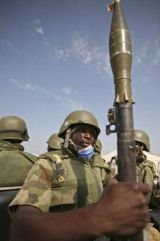Darfur force may fail if problems not settled – UN
November 14, 2007 (UNITED NATIONS) — A planned U.N.-African Union peace force for Darfur could fail unless disputes with Sudan over its make-up are resolved and key specialized units found, the top U.N. peacekeeping official said on Wednesday.
 The 26,000-member force aims to bring security to the western Sudanese region after 4-1/2 years of conflict between government forces, allied militias and rebels. Even before its full deployment, it is meant to take over from an overwhelmed AU force of 7,000 at the end of this year.
The 26,000-member force aims to bring security to the western Sudanese region after 4-1/2 years of conflict between government forces, allied militias and rebels. Even before its full deployment, it is meant to take over from an overwhelmed AU force of 7,000 at the end of this year.
But in his most pessimistic public assessment so far of prospects for the force, U.N. peacekeeping chief Jean-Marie Guehenno said: “We believe that now is the time really to face very important decisions, because the clock is ticking.”
If the problems were not addressed quickly, “it means that the mission in 2008 … will not be able to make the difference that the world wants it to make and that it may become a failure,” he said after briefing the Security Council.
Sudan says the force must be predominantly African and has so far failed to give approval to a Thai infantry battalion, a Nepalese special forces unit and a Swedish-Norwegian-Danish engineering unit. The United Nations says that even with those contingents the force will still be three-quarters African.
“They (Sudanese authorities) are saying that they want to continue technical discussions,” Guehenno, who diplomats said had just returned from meeting Sudanese military officials in Ethiopia, told reporters.
In addition, no country has so far offered required ground transport equipment or met a U.N. request for 18 transport helicopters and six attack helicopters.
Diplomats have said that countries that could provide such equipment, which they say are likely to be non-African, are either overstretched elsewhere or worried about the command and control arrangements of the joint U.N.-AU force.
DILEMMA
Guehenno said it was “up to the countries that care about Darfur to really make the commitment that will make a difference. I think this is a time for concrete action.”
Asked if it made sense to deploy a force lacking key units, Guehenno said: “That’s the dilemma … that the Security Council, that the government of Sudan have to face.”
Without such units, the force would be less able to defend itself or protect civilians and less credible, he said.
International experts estimate 200,000 people have died in the Darfur conflict and 2.5 million driven from their homes, but Sudan says only 9,000 have died. Peace talks between Khartoum and some rebel groups opened in Libya last month but have made little progress.
Speaking for the 15-nation council after the meeting, its president, Ambassador Marty Natalegawa of Indonesia, called for “full cooperation from all parties, including the government of Sudan, in this endeavor” and stressed “the urgent need for the remaining capability gaps (in the force) to be filled.”
French Ambassador Jean-Maurice Ripert told reporters that “the feeling we have after listening to the report of Mr. Guehenno is that we are … seriously preoccupied.”
“It doesn’t enable the (U.N.) Secretary-General (Ban Ki-moon) to fulfill (the) mandate of putting on the ground the force very rapidly … and we think the government of Sudan should face its responsibility,” he said.
“This is not acceptable,” he added. “The time has come to act.”
(Reuters)
